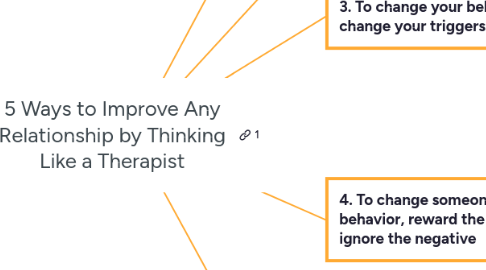
1. 1. For better communication, validate first, problem-solve second
1.1. Treat people’s struggles like a problem. It's invalidating
1.1.1. It's a recipe for defensiveness, communication breakdowns, and long-term relationship trouble
1.2. Validate someone’s struggles.
1.2.1. Initial validating statements will help the person feel like they're really being heard and that you’re with them
1.2.2. It simply means letting them know that you understand what they’re saying and that it makes sense that they’re feeling that way.
2. 2. To be more compassionate, find the function
2.1. Take the time to understand why they might have done something, and acknowledge that on a certain level it makes sense.
2.1.1. That way you can become a little more compassionate towards them
3. 3. To change your behavior, change your triggers
3.1. Change the environmental triggers that set your behavior in motion in the first place
3.1.1. Instead of looking at something as a personality flaw or a character defect, try to look at it as a natural response to the unique environment you’ve built
4. 4. To change someone else’s behavior, reward the positive and ignore the negative
4.1. Reward desired behaviors and withhold rewards from an undesired behavior
4.2. Ignore the problem behavior and focus your energies on reinforcing a better alternative behavior
4.3. Differential reinforcement:
4.3.1. Try to encourage and reinforce a better alternative behavior
4.3.2. Ignore the unwanted behavior and stop feeding it with your attention
4.3.3. Inject your relationship with constructive positivity rather than criticism and negativity
5. 5. For more intimacy, practice being vulnerable
5.1. Share a brief story of how you struggled with something similar to their struggle
5.2. Allow yourself to tear up when someone tells you a particularly sad story
5.3. Practice being vulnerable in small ways
5.3.1. You’ll steadily gain the confidence you need to be vulnerable in big ways
